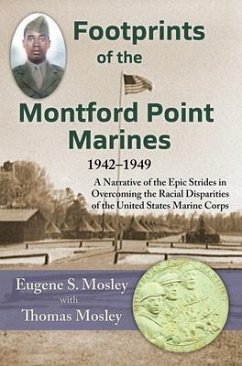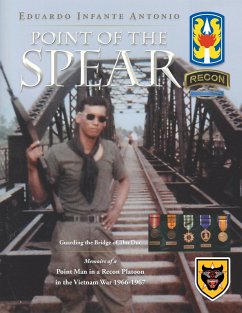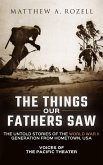Footprints of the Montford Point Marines explores historic information about the Montford Point Marines and also my dad, Corporal Thomas Mosley, while serving with the first group of African American Marines in the United States. This is the story of a brief period of his life, from Montford Point Camp to the Pacific in World War II, and seventy years later being awarded the Congressional Gold Medal by Congress.
These men came from all parts of the United States to the South to train at a segregated facility called Montford Point Camp, adjacent to Camp Lejeune, North Carolina, the largest all-purpose Marine base in the world. It had the best equipment for all types of military training, but these new black enlistees at the adjacent Montford Point Camp were not allowed to enter unless accompanied by a White officer-Camp Lejeune was exclusive to White Marines and their families only. With World War II looming, the government needed all hands on deck and created millions of new jobs in preparation but continued keeping Blacks out of the job market and housing.
With the pressure imposed by groups such as the NAACP, President Franklin D. Roosevelt had to rethink these exclusions, at least in the federal workplace, and through negotiations with many groups, led by A. Philip Randolph, Executive Order 8802 was issued by President Roosevelt on June 25, 1941, to counter racial discrimination. The U.S. Marine Corps was part of the defense industry, and as a result had to open their ranks to African Americans who wished to serve. The Montford Point Marines became giants in the Asiatic Pacific and were some of the greatest heroes this country has ever known.
Through swamps, hills, and worse terrain, under heavy enemy gunfire, they were able to supply ammunition, fuel, food, and medical supplies to troops on the front lines where most others had failed. They were also charged with removing the dead and wounded back to the safety of the ships waiting offshore. Eventually they were called to the front lines and fought in every major battle in the Pacific islands.
Some seventy years later, on June 27, 2012, approximately four hundred of these brave men, mostly in their eighties and nineties, finally received their just recognition by receiving Congressional Gold Medals. Other families received the medal posthumously. From 1942 to 1949, the 19,168 Montford Point Marines paid the price so others could follow in their footprints to continue the legacy of the few, the proud, the Marines: Semper Fidelis (Always Faithful). They were also known as "The Chosen Few."
These men came from all parts of the United States to the South to train at a segregated facility called Montford Point Camp, adjacent to Camp Lejeune, North Carolina, the largest all-purpose Marine base in the world. It had the best equipment for all types of military training, but these new black enlistees at the adjacent Montford Point Camp were not allowed to enter unless accompanied by a White officer-Camp Lejeune was exclusive to White Marines and their families only. With World War II looming, the government needed all hands on deck and created millions of new jobs in preparation but continued keeping Blacks out of the job market and housing.
With the pressure imposed by groups such as the NAACP, President Franklin D. Roosevelt had to rethink these exclusions, at least in the federal workplace, and through negotiations with many groups, led by A. Philip Randolph, Executive Order 8802 was issued by President Roosevelt on June 25, 1941, to counter racial discrimination. The U.S. Marine Corps was part of the defense industry, and as a result had to open their ranks to African Americans who wished to serve. The Montford Point Marines became giants in the Asiatic Pacific and were some of the greatest heroes this country has ever known.
Through swamps, hills, and worse terrain, under heavy enemy gunfire, they were able to supply ammunition, fuel, food, and medical supplies to troops on the front lines where most others had failed. They were also charged with removing the dead and wounded back to the safety of the ships waiting offshore. Eventually they were called to the front lines and fought in every major battle in the Pacific islands.
Some seventy years later, on June 27, 2012, approximately four hundred of these brave men, mostly in their eighties and nineties, finally received their just recognition by receiving Congressional Gold Medals. Other families received the medal posthumously. From 1942 to 1949, the 19,168 Montford Point Marines paid the price so others could follow in their footprints to continue the legacy of the few, the proud, the Marines: Semper Fidelis (Always Faithful). They were also known as "The Chosen Few."
Dieser Download kann aus rechtlichen Gründen nur mit Rechnungsadresse in A, D ausgeliefert werden.









